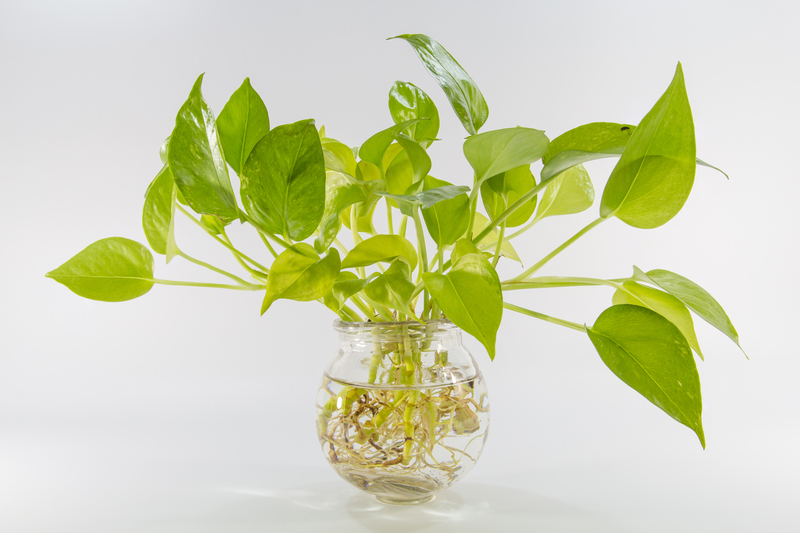Unearth the Basics: 9 Tips for Aspiring Gardeners
Posted on 13/09/2025
Unearth the Basics: 9 Tips for Aspiring Gardeners
Dreaming about starting your own thriving outdoor oasis? Gardening is more than just a hobby; it's a rewarding journey that brings fresh air, joy, gorgeous landscapes, and even nutritious produce into your life. If you're just beginning your green-thumb adventure, don't worry--success is within reach! In this detailed guide, we'll walk you through the foundations of gardening and share nine essential tips every aspiring gardener should know.
1. Choose the Right Location for Your Garden
Finding the optimal spot for your garden is a critical first step that affects everything from sunlight exposure to soil drainage. Gardening basics dictate that most vegetables, flowers, and herbs require at least 6 hours of sunlight daily. Observe your yard or balcony at different times of the day and note where the sun lands.
- Sun-loving plants: Tomatoes, peppers, roses, and sunflowers thrive in direct light.
- Shade-tolerant plants: Ferns, hostas, and impatiens flourish in less sunny locations.
Bonus tip: Consider convenience. Placing your garden near a water source and within view makes maintenance and harvesting much easier!

2. Understand Your Soil
Your soil type is the foundation of all successful gardening. Start by testing your soil's pH, texture, and nutrient content. Most home improvement stores sell easy-to-use soil test kits.
Common Soil Types:
- Clay: Dense but nutrient-rich; needs organic matter for drainage.
- Sandy: Drains quickly but doesn't retain nutrients well.
- Loam: Ideal with balanced drainage, texture, and nutrients.
Tip: Mix in compost, aged manure, or organic material to improve poor soils. Good soil boosts plant health and yields, a must for beginner gardeners eager for lush results.
3. Start Small & Simple
It's tempting to transform your entire yard, but beginning gardening with a manageable project ensures you stay motivated and avoid feeling overwhelmed.
- Choose a modest plot--4x4 feet is perfect for your first vegetable bed.
- Try container gardening on patios or balconies for herbs and salad greens.
- Grow easy starter plants: lettuce, radishes, marigolds, and zinnias.
Remember: Success breeds confidence. As your gardening skills grow, so can your garden!
4. Select the Right Plants for Your Region
One of the smartest tips for aspiring gardeners is to choose plants that naturally thrive in your local climate and soil. Learn about your USDA Plant Hardiness Zone or equivalent for your country. Consult local gardening centers or extension services for advice.
Choosing Plants:
- Native species: Require less water, resist pests, and support local wildlife.
- Seasonal choices: Cool-season crops (spinach, pansies) for spring or fall; heat-loving crops (tomatoes, petunias) for summer.
Expert hint: Reading seed packets and plant tags offers valuable care tips and planting windows.
5. Master Watering Techniques
One of the biggest beginner gardening mistakes is improper watering. Plants can suffer from both overwatering and drought. Follow these guidelines to keep your garden hydrated without drowning it:
- Water early: Morning is best to reduce evaporation and prevent disease.
- Target the roots: Soak soil at plant bases, not leaves, to minimize fungus.
- Check moisture: Stick a finger an inch deep--water only if it feels dry.
- Mulch: Adding a 2-3 inch layer of organic mulch retains soil moisture and suppresses weeds.
Pro tip for new gardeners: Most vegetables and flowers thrive with about 1 inch of water per week, from rain or irrigation.
6. Feed Your Plants the Right Way
Plants, like people, need balanced nutrition. Regular fertilization is key to bountiful harvests and vibrant blooms. Organic fertilizers--such as compost, worm castings, or fish emulsion--offer a gentle, eco-friendly nutrient boost.
Fertilization Basics:
- Compost: Builds healthy soil and reduces waste.
- Slow-release fertilizers: Provide steady nutrients for months.
- Liquid feeds: Give quick energy to stressed or potted plants.
Always follow packaging instructions; too much fertilizer can harm plants or disrupt soil health. Strong, resilient gardens begin with rich, living soil!
7. Practice Consistent Maintenance
Consistency is your ally when learning how to garden. Stay on top of chores and your plants will reward you:
- Weed regularly: Pull out weeds before they mature and compete for resources.
- Prune as needed: Remove dead or diseased growth to stimulate healthy new shoots.
- Inspect often: Check leaves and blooms for pests or disease and act quickly if needed.
Write a weekly to-do list--watering, feeding, harvesting, and more--to develop good habits and prevent surprises.
8. Learn Pest and Disease Management
Even the healthiest gardens can fall prey to insects or plant diseases. Integrated pest management (IPM) is a modern, eco-friendly approach that every aspiring gardener should learn.
Eco-Friendly Pest Solutions:
- Hand-pick pests: Removing beetles and caterpillars by hand is effective.
- Encourage beneficial insects: Ladybugs, lacewings, and bees are natural allies.
- Use barriers: Row covers and netting protect crops from invasion.
- Opt for organic sprays: Neem oil, insecticidal soap, or homemade garlic spray as a last resort.
The best defense is a healthy garden--strong plants better resist threats. Early detection and prompt action will keep your lush sanctuary thriving all season!
9. Keep Growing & Stay Curious
The essential gardening tip: View every season as a new chapter to learn, experiment, and celebrate little victories. Read gardening books, watch tutorials, join local clubs, and connect with other enthusiasts online. Keeping a journal to track your progress (weather, plant health, yields) will give you insights year after year.
- Visit botanical gardens for inspiration and advice.
- Try growing something new each season--microgreens, heirloom tomatoes, rare flowers.
- Remind yourself that mistakes are opportunities to grow. Every gardener, no matter how experienced, is always learning!

Frequently Asked Questions for Beginner Gardeners
How much time does it take to care for a small garden?
Most small gardens need about 30 minutes of care a few times a week--watering, weeding, and harvesting. As gardens grow, so does the investment of time, but the rewards are greater!
Can I grow a successful garden in containers?
Absolutely! Many vegetables, herbs, and flowers thrive in pots, making container gardening ideal for patios, balconies, or small spaces. Just ensure good drainage and appropriate potting mix.
What should I do if I make a mistake?
Don't worry! Every gardener faces unexpected challenges. Learn from each setback, adjust your techniques, and don't hesitate to ask for help or research solutions.
Start Your Gardening Journey Today
Gardening can transform your outdoor or indoor space, nourish your body, and uplift your spirit. Equipped with these 9 gardening tips for beginners, you're ready to get your hands dirty and watch your vision grow--literally!
- Pick a spot, test your soil, and start with a few easy plants.
- Keep learning, stay patient, and celebrate every sprout and blossom.
- Join the global community of gardeners and unearth the joys awaiting just beyond your doorstep.
Happy gardening! With a little guidance and a lot of curiosity, there's no limit to what you can achieve as a new gardener. Are your gloves on yet? It's time to dig in and grow!
Latest Posts
Explore the Climate Impact of Regenerative Gardening
3 Golden Rules for Sustaining a Beautiful, Weed-Free Garden
How to Organize a Garden Filled with Adventures for Kids

